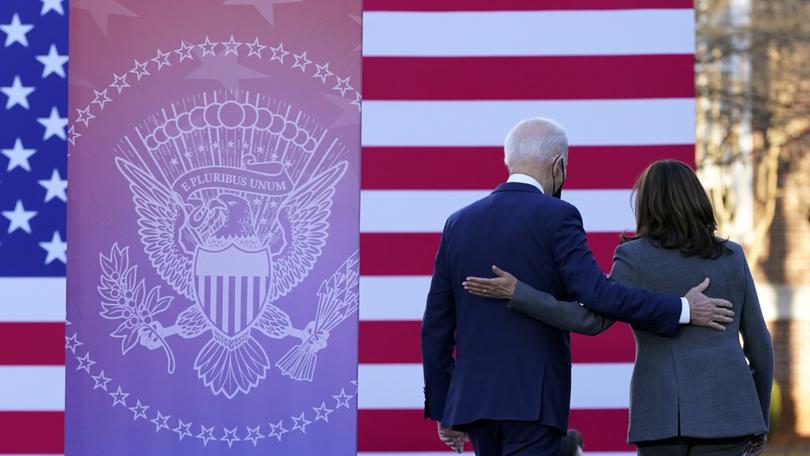US President Joe Biden has given Democrats a second chance to win the White House
After surviving an attempted assassination, Donald Trump is the strong favourite to become America’s 47th president. Thanks to a parting gift from Joe Biden, Trump is still beatable.

It will later come to be seen as inevitable, perhaps, but President Joe Biden’s decision not to stand for re-election had America and the world on the rack for three and a half agonising weeks.
Now that he has given way, much rests on how his party handles the search for someone to replace him.
After surviving an attempted assassination and basking in a triumphant convention, Donald Trump remains the strong favourite to become America’s 47th president.
Sign up to The Nightly's newsletters.
Get the first look at the digital newspaper, curated daily stories and breaking headlines delivered to your inbox.
By continuing you agree to our Terms and Privacy Policy.Thanks to Mr Biden’s withdrawal, he is still beatable.
Unfortunately, persuading a stubborn old man to back down was the easy part.
The Democratic convention begins on August 19. To maximise their chances, Democrats now need to tread a difficult line between acting fast, preserving their unity and finding the best possible candidate.
Some party elders appear to have decided to focus on speed by endorsing Mr Biden’s vice president, Kamala Harris.
That is not in the Democratic Party’s best interest, nor even Ms Harris’s. She has not yet demonstrated that she is a strong candidate. The more she appears to have been foisted on her party, the harder she will find it to win.
After a lifetime of refusing to take no for an answer, Mr Biden fought to the bitter end.
However, despite numerous television appearances, he could not dispel the image of a stumbling and befuddled old man unfit to serve a second full term.
Polling suggested that he was behind in all the places he needed to win on November 5th. Even supposedly safe states, like Virginia and Maine, were in danger of going Republican. As governors, senators and congressmen saw Mr Biden dragging down their chances of remaining in office, the party began to rise up against him.
The president’s parting letter spoke of his own achievements, and there are many, including climate policy, a strong economy and his support for Ukraine.
His time in office was more worthy of being remembered for all that than for clinging grimly to power even at the cost of a Trump victory.
Now that he has shown leadership, even if belatedly, he has one last duty, which is to help his party find a replacement who can win.
Mr Biden’s first task is to help the party avoid a row about what to do next. He has already endorsed Ms Harris, as have Bill and Hillary Clinton, a former president and secretary of state.
Nancy Pelosi, a former speaker, and Barack Obama, another president, have not but may do so. Crucially, both have leaned towards an open process. If senior figures resist, there could be a destructive power struggle over how to proceed. Having already wasted so much time, Democrats have little to spare.
Because a divided party will struggle to win the election, some therefore want Ms Harris to go forward uncontested.
She has the name-recognition, the experience of working in the White House and, it seems, the backing of some senior Democrats. She would also be the first woman to serve as America’s president—and the first of African and Asian descent. Many in the party feel that to pass her over would not only be wrong in principle but would also drive away black and female voters.
In fact, the coronation of a candidate whom Republicans have already started to call Mr Biden’s “enabler in chief” would be second best.
A genuine race would bring scrutiny, valuable attention from the news media and, crucially, legitimacy. Handled right, that could enhance party unity and enthuse the thousands of foot soldiers who must sell their new nominee to voters and who may already resent how Mr Biden’s deteriorating health was hidden from them. That could also invigorate the down-ballot races.
Ms Harris would have something to gain from such a competition, too.
She would begin as the overwhelming favourite, but she would then be recognised as having achieved the nomination by virtue of her own political skills. That would serve her well in the campaign and with voters.
Ideally, Democrats would hold a brief and open competition between their best and brightest.
After Mr Biden’s decision to withdraw, the 4,700 or so delegates to the convention are free to vote for whomever they choose to become their party’s candidate.
There is no shortage of contenders: Governors Gretchen Whitmer of Michigan, Jared Polis of Colorado, Andy Beshear of Kentucky and Josh Shapiro of Pennsylvania are impressive.
From the cabinet, Gina Raimondo and Pete Buttigieg are worth a look.
In the Senate, Mark Kelly and Raphael Warnock—the first an astronaut, the second a preacher—would make an interesting contrast with Mr Trump.
The Democrats’ problem is not a lack of talent: it is how to choose between all of it in the short time they have left.
Some of these candidates may be tempted to sit out this election, in the belief that it would boost their chances in 2028. If Democrats mean what they say about the stakes in this election, that would be reprehensibly cynical.
Finding the balance between speed, unity and legitimacy will be hard, but in the past Democrats have too often succumbed to pragmatism and deference, both of which favour Ms Harris.
To impose her so soon after concealing Mr Biden’s infirmities would not serve them or America well.
Time is short. Mr Biden has given Democrats a second chance to win a race that looked beyond their grasp. They must not waste it.
